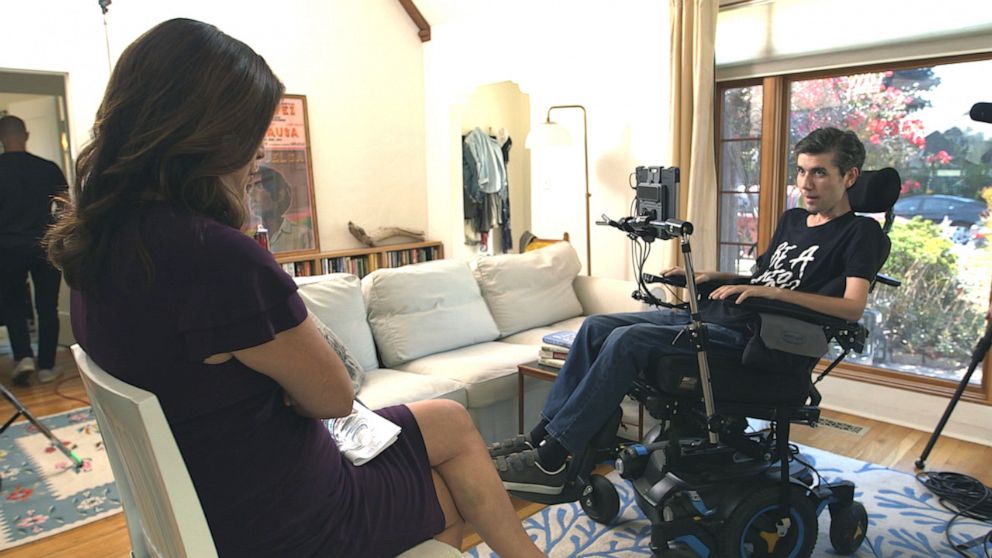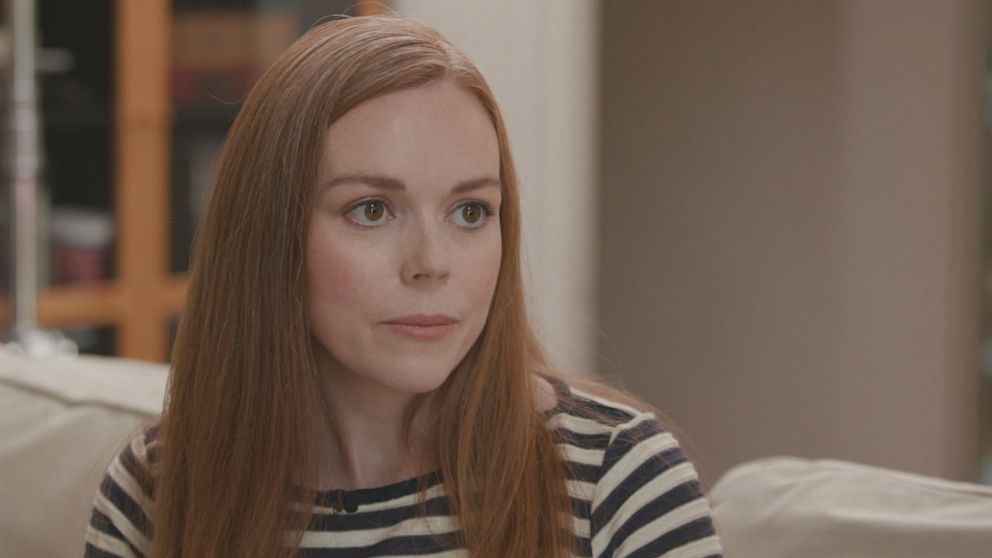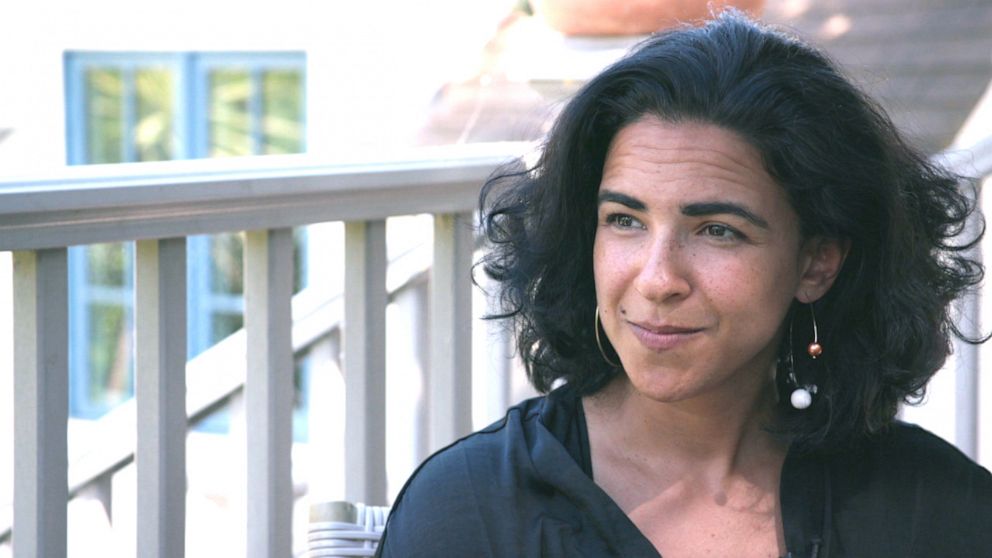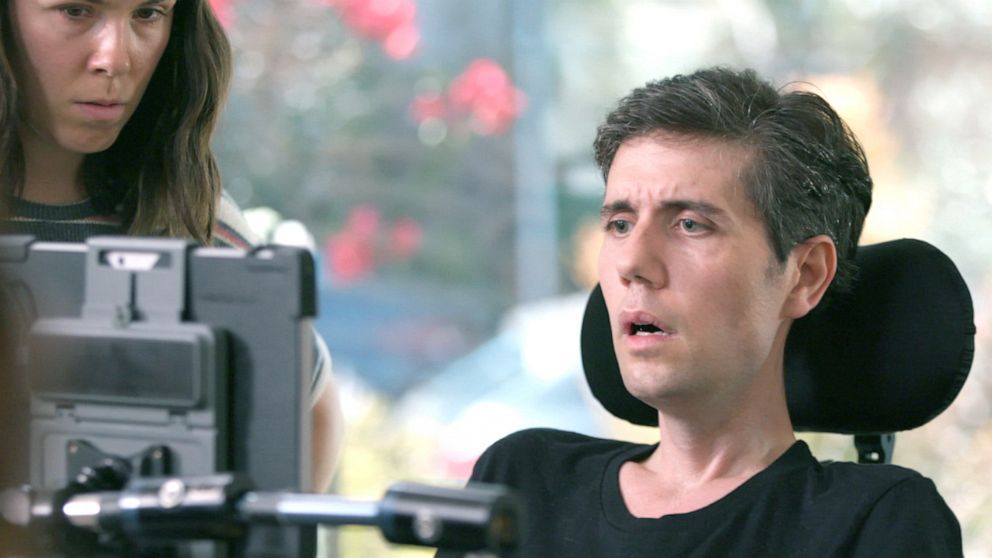Medicare for All activist with ALS Ady Barkan on why he advocates: ‘It gives me a reason to get up every day’
Barkan has become one of the most important voices for Medicare for All.
Every day, Ady Barkan hopes that what little time he has left to live will count for something.
“Fighting for justice gives me purpose,” Barkan told “Nightline.” “It gives me a reason to get up every day. I much prefer to focus on the struggle for our democracy than to focus on ALS.”
ALS (amyotrophic lateral sclerosis) has already robbed Barkan of his ability to walk, talk and even eat on his own. But the deadly disease has also transformed him into one of the most influential voices supporting “Medicare for All,” making him a kingmaker for Democratic presidential hopefuls.
Barkan’s story is so moving that Elizabeth Warren spoke about him and his family during the second Democratic debate.
“Every month he has about $9,000 in medical bills [that] his insurance company won’t cover… His wife Rachael is on the phone for hours and hours...begging the insurance company, ‘Please cover what the doctor says he needs,’” she said. “The basic profit model of an insurance company is: Take in as much money as you can in premiums and pay out as little as possible in health care coverage. That is not working for Americans across this country.”
But Barkan’s fame started out with a fluke. On his flight home after being arrested for protesting the 2017 GOP tax reform bill, he bumped into then Arizona Senator Jeff Flake and pleaded with him to vote against the bill, which was all caught on video.
“You can save my life, please,” Barkan implored the Republican senator. “Please remember this conversation.”
The two shook hands and Flake remarked, “You’re very up on everything, aren’t you?”
“My life depends on it,” Barkan responded.
Flake ultimately voted in favor of the bill, but his and Barkan’s interaction quickly went viral, changing the nature of Barkan’s advocacy from then on.
Since his ALS diagnosis at age 32, Barkan has grown physically weaker, but his political voice has grown even stronger.
“Health care is not treated as a human right in the United States of America,” he told the Democratic Rules committee in a congressional hearing this past April. “This fact is outrageous.”

He's spearheaded protests on Capitol Hill since 2017, where he has chased down opposing politicians. He even toured the country pushing his progressive agenda.
With one social media post, Barkan raised nearly $4 million to oust Republican Senator Susan Collins.
“Medicare for All means that we get high quality comprehensive health care through Medicare, with no copays or deductibles or premiums,” he explained.
“Republicans and Democrats, tens of millions of people don’t have health insurance,” he said. “Millions more have to fight with their insurance company every day when those companies try to deny coverage for necessary care. Ten years ago, Medicare for All was a fringe idea and now it enjoys the support of a majority of the American people.”
At 35 years old, Barkan is now essentially paralyzed from the neck down and he uses his eyes to communicate, picking letters one by one. Because of this, “Nightline” sent him questions in advance so he'd have time to respond.
“Everything about ALS is terrible,” he said. “My body became weaker and weaker. I lost the ability to run and then to walk fast and then to walk at all. I typed with one hand and then I couldn't type at all. The worst symptom of all is losing the ability to speak. And together, all of that adds up to a radically limited ability to be the father I want to be.”
“One hundred times every day, I despair at my inability to tickle and chase [my son] Carl, to help him build towers and train tracks, to read stories and tell jokes, to comfort him in the middle of the night and to scold him when he dumps his dinner plate for the fifth night in a row. That's the hardest part of ALS,” he said.
Barkan said he has also been forced to confront his own mortality.
“That is why I am not shy about death,” he said. “I really just want my life and death to mean something.”
His wife Rachael King fully embraces his life’s mission despite knowing that it’s taking a toll on his failing body and reducing the amount of time — his most precious commodity — that he has left with his family.
“When he got back from the tour last summer, his voice was noticeably worse,” she said. “There was sort of this feeling of, like, ‘Oh, we kind of lost that time when we could have been speaking more.’ But, you know, I think overall, it's given him so much strength to try to find some sort of meaning in what, at first, just seemed like this random horrible thing that happened to us.”

It was just three years ago when the college sweethearts welcomed their baby boy Carl. Both their careers were hitting their stride — after Yale Law School, Barkan was fighting for low-income workers’ rights and King was teaching English at UC Santa Barbara.
“I really clearly remember one morning thinking to myself, ‘How could life get any better than this?’ I mean, we were just so happy,” she said.
That all changed when “Ady had been having some pain and weakness in his left hand and he thought it was carpal tunnel syndrome,” King said. “He had been rocking Carl a lot in his left arm… So he thought that’s what was contributing to his pain.”
The doctor diagnosed him with motor neuron disease, which is “sort of the precursor to ALS,” King explained.
“It felt suddenly like we were wondering if Ady would see Carl go to kindergarten,” she said. “Will Carl ever remember Ady? And you're told, you know, it's a prognosis of three to four years.”
King said that at first, “he couldn’t see any meaning in it. It felt like everything had been taken away.”
To make matters worse, the young couple soon discovered their insurance company was denying coverage for necessary medical care, such as the ventilator that helped him breathe.
“All of the confusing paperwork we get from the health insurance company and having to parse that and figuring out what they’re saying — spending time appealing,” she said. “For us, that’s a little bit easier because Ady can put something on Twitter and put pressure on the health care company but other people aren’t able to do that.”
King said the family pays $9,000 a month out of pocket for home health care “just to help Ady be able to kind of be part of everyone’s lives [and] to get up and get dressed.”
Much of these medical costs are paid through GoFundMe donations.
“It’s not, as Ady has said, a substitute for a functional health care system,” she said. “And you shouldn’t get care based on how sympathetic you are.”
Barkan admitted that early on he felt lost and overwhelmed by all of it.
“Three weeks after my diagnosis, we were dealt another huge blow when America elected a racist, sexist [person] to the presidency,” he said. “As he and the Republicans did more and more to undermine our democracy and our social fabric, I decided I had to throw myself into the fight.”
His first battle played out on social media with the viral video of Flake, dubbed “#FlakesOnAPlane,” which gave him a powerful platform. Liz Jaff, who recorded the interaction, had only met Ady moments before the in-flight moment.
“What we saw on the plane was a human interaction. I mean, everybody on the plane was crying at the end of it,” Jaff said. “When Ady lands from Santa Barbara, we [were] at over a million views on this video, which is…I mean, insane.”
Jaff, an Obama staffer-turned-political-consultant, became his impromptu new partner in crime.

“I basically stopped doing any other work I was doing and sat down with him and said, ‘We have something here. You are a messenger. What do you want to do?’ And he said, ‘I think we should start a Super PAC. We should do it for the little people,’” Jaff said.
They named their super PAC “Be a Hero,” and though it, they raised more than a $1 million to support Democrats across the country who were running in the 2018 midterm elections.
“We cut ads. They were run in 100 districts,” Jaff said. “We won every single race [that] we ran our ads in. We flipped a bunch.”
House Speaker Nancy Pelosi even thanked Barkan for helping win back the house for Democrats, telling him that “nobody’s been a stronger messenger than you, our hero.”
Jaff also responded to criticism that the team is exploiting Barkan’s disease for political gain.
“If the only way that we’re going to force people to talk about these issues is with somebody [like] Ady, that he has to be this sick for people to pay attention, then we need to do it.”
“To pretend it’s not [shrewd calculation] is crazy,” she added. “It is a political strategy, every step of the way.”
Barkan said definitively: “This is not exploitation.”
“I would [do] anything to be anonymous again. I would give anything to just be a happy father and husband,” he said. “We have to be able to tell our human stories if we want our democracy to be responsive to us as individual human beings.”
Those personal stories are front and center in his new show, “Uncovered: Health Care Conversations with Ady Barkan.”
Only 2020 Democratic candidates Bernie Sanders and Elizabeth Warren support Medicare for All, yet all the major Democratic candidates except for former Vice President Biden have agreed to sit down with Ady.
These conversations help turn tedious policy debate into a shared human experience.
“Kamala Harris is so strong. She broke down when she talked about her mother and the loss of her mother, and the entire team is breaking down,” Jaff said. “Elizabeth Warren, [who] similarly doesn't get emotional all the time, also broke down. Cory Booker, Julian Castro, the candidate[s] suddenly realize that these are the people that they are protecting when they want to run for president. You want to remind them of that.”
Barkan said he was inspired to create the show after being “frustrated” by the first presidential debates.
“Health care is the number one issue on people's minds. And yet, the conversation that the country saw in those first couple of debates was little more than a bunch of shouted 30 second soundbites,” he said. “I thought people deserved better, so these conversations are a way to go beyond talking points and press candidates to get specific and personal about how they see the health care crisis in this country.”
Barkan’s crusade has a sense of urgency; just two days after his interview with “Nightline,” he was rushed to the emergency room and admitted into the hospital’s intensive care unit.

“I don't think everybody out there can be as strong as this,” said Jaff. “I see him suffer through …these things, really pushing it, when he's desperate to speak more, when he's desperate to say more, like, that's what a hero does. They just put themselves on the line.”
“I think he can keep fighting for as long as he wants to,” King added. “You know, I think ALS is a really hard disease to live with and he needs a lot of support and we need a lot of support. But with that kind of structure, you know, I think you can keep going and have a meaningful life.”
Barkan details that meaningful life in his new book, “Eyes to the Wind,” which is part political manifesto and part personal memoir. For Barkan, his best chapter still lies ahead — him and King will soon be welcoming another baby into the family.
“I'm super jazzed. It's going to be great. Our lives are so crazy now with the toddler and with ALS. Another baby will be a piece of cake,” Barkan laughed. “Honestly, Rachael carries 95% of the childcare duties. So I am worried about how she will manage. But I will do what I can to organize support for her.”
The couple’s daughter is due in November, but in his fragile state, election day in November 2020 is far from guaranteed.
“It’s so hard to think about Ady not being here… I can so vividly picture what our life would be like if Ady didn’t have ALS,” King said.
“At the end of the day, I want to be remembered as someone who tried to live up to the privilege conferred on me by the circumstance of my birth as someone who fought to make the world a little more fair and just for all,” Barkan said. “And most of all, I just want Carl and his sister to be proud of me.”




